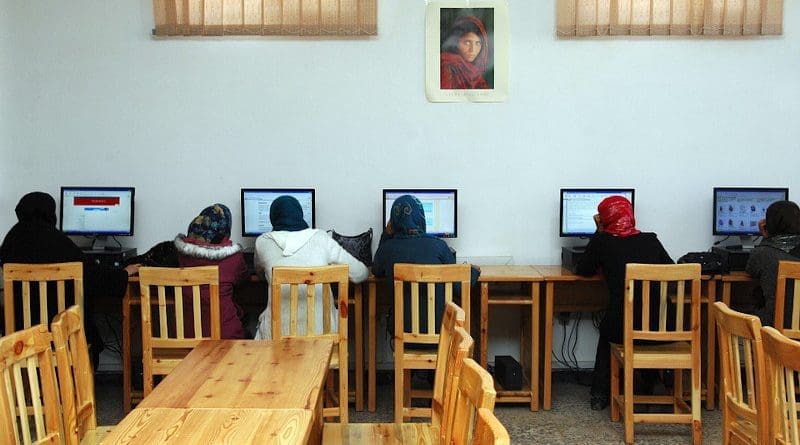Afghanistan’s Education Sector: Prospects Under Taliban Rule – Analysis
By IPCS
By Dr. Fazlullah Akhtar and Dr. Amit Ranjan*
Two decades of war conducted by the US and its allied forces against the Taliban ended in August 2021 with the Taliban’s return to power in Afghanistan. If precedents are any indication, the Afghan education sector is one of the key sectors set to be severely affected under Taliban rule, risking the loss of advancements made since 2001. This is also evident in the Taliban’s actions vis-à-vis Afghan educational institutions and universities—which have caused widespread dissatisfaction among many Afghans.
Advancements Made Between 2001 and 2021: A Brief Overview
Since the overthrow of the Taliban in 2001, the Afghan education sector underwent exponential development. Estimates indicate that between 2001 and 2015, total enrolments in primary education increased from around 0.9 million to 9.2 million. The proportion of girls’ enrolment too rose from zero to 39 percent. During the Taliban regime (1996-2001), Afghanistan had only seven public universities, where too learning was characterised by extreme shades of the Taliban’s ideological outlook and based on non-scientific curricula, with almost no linkages to foreign universities or academic institutions. In the post-2001 era, the number of public universities and higher education institutions rose from seven to 39 (24 universities and 15 higher education institutes).
In 2001, there were no private universities in Afghanistan. By 2021, there were 129 registered private universities and higher education institutions operating across the country. Private institutions not only increased options for access to education for more students but also helped reduce the strain on public universities and generated jobs in the education sector. In 2001, only around 7000 students were enrolled in public universities. This number rose to 197,247 by 2019. Similarly, female enrollments in public higher education institutions rose from virtually zero in 2001 to over 54,861 by 2019. The quality of curricula has always been a concern but the credit nonetheless goes to the elected administrations in Afghanistan that focused on the education sector to a greater extent between 2001-2021.
Prospects of the Afghan Education Sector Under the Taliban
In a bid to stem the outflow of educated persons and professionals from the country, Taliban Spokesperson, Qari Yusuf Ahmadi, said “[t]hey are our professionals, and Afghanistan’s future will be in their hands…Those that leave will be forgiven if they come back to Afghanistan…They are our heroes, they should not be worried…[o]ur message is to wait – we are just beginning.” However, almost no one leaving or attempting to leave Afghanistan believes the Taliban’s assurances.
There is a mismatch between the group’s words and actions. Upon seizing power in Afghanistan in August 2021, the Taliban’s acting Education Minister, Abdul Baqi Haqqani, announced a review of the subjects that would be taught in the country. Haqqani stated that under the current dispensation, women can attend universities but in gender-segregated classrooms; and a full-body veil (the Taliban’s interpretation of an ‘Islamic dress’) has been made mandatory. Unlike during the Taliban rule of the 1990s, this time, the group has indicated that it would not ban women from schools and universities. However, at present, schools have reopened for boys but not for girls in most places.
The Taliban have demonstrated an intent to transform the country’s education system into what they call a “real Islamic institution,” and do away with what they consider “Western and infidel thoughts.” Deeming those who graduated between 2001 and 2021 as being “of no use,” the Taliban has sought teachers who can instill religious values among students. Given the attitude of the Taliban, who believe Masters and PhD qualifications are unimportant as their leaders in cabinet and mullahs (clerics) are the “greatest” even without them, it is likely that the Afghan education system will collapse, causing a dire shortage of qualified and trained personnel to run the education sector. In another recent statement, Haqqani said ‘[w]e have no expectations from those who have done schooling in the last 20 years’. This drew sharp criticism from the Afghan public across social, print, and electronic media, wherein they chastised the Taliban for their anti-modern education stance.
The Taliban’s intention to dismantle Afghanistan’s existing higher education sector is also evident in their decision to appoint ex-Taliban fighter, Mohammad Ashraf Ghairat, as Kabul University’s new chancellor after forcing out Prof M Osman Babury, a renowned scientist and seasoned academic. The group has appointed clerics as the chancellors of Paktia and Kandahar universities too. In response to these arbitrary replacements, around 70 Kabul University professors resigned and many more threatened to resign soon if the Taliban did not reconsider their decision. Approximately 200 teaching staff of Kabul University have already left the country and it appears that a similar situation is likely to unfold at other universities and higher education institutions.
Looking Ahead
The current state-of-affairs in Afghanistan indicate that prospects for fostering critical thinking—an objective of any form of education—are extremely low if not non-existent. The ideological education under the Taliban rule would certainly enable the group to remain in power for a long time, but it will also certainly destroy whatever progress Afghanistan made in the education sector between the fall of the Taliban in 2001 and their return to power in 2021.
*Dr Fazlullah Akhtaris a Postdoctoral Fellow at the Center for Development Research, University of Bonn, Germany. Dr Amit Ranjan is a Research Fellow at the Institute of South Asian Studies, National University of Singapore, Singapore.

